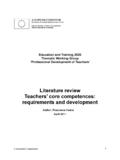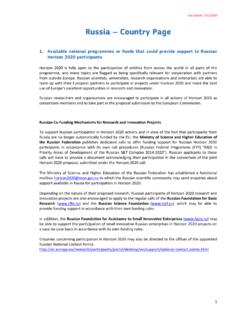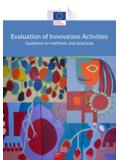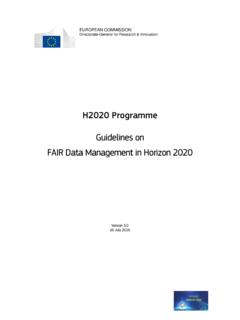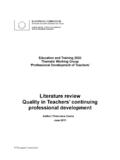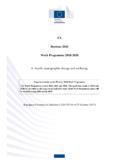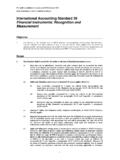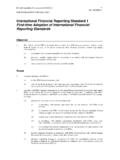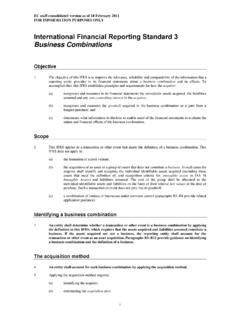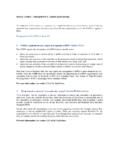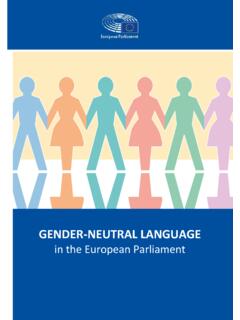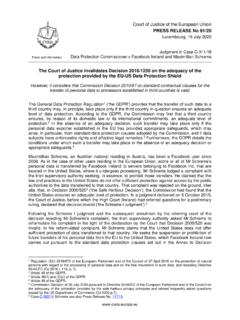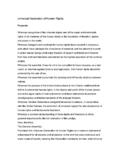Transcription of Ethics in Social Science and Humanities - European …
1 Ethics in Social Science and Humanities October 2018 Disclaimer This document has been drafted by a panel of experts at the request of the European commission (DG Research and Innovation) and aims at raising awareness in the scientific community, and in particular with beneficiaries of EU research and innovation projects. It does not constitute official EU guidance. Neither the European commission nor any person acting on their behalf can be made responsible for the use made of it. 2 Table of Contents 1. Introduction .. 3 2. General principles/underlying ethical principles.
2 4 3. Ethical dimensions of research methodology .. 5 Use of deception .. 6 Covert research .. 7 Internet research and Social media data in research .. 8 Research participation .. 11 Vulnerable participants .. 11 Children in research .. 12 4 Informed consent .. 13 5 Findings outside the scope of the research: unintended/unexpected/incidental findings 14 6 Data protection and privacy .. 15 7 Sites of research .. 16 Risks, harm and risk assessment .. 18 Risks and harm in SSH .. 18 Risk assessment .. 19 Checklist for higher-risk SSH research .. 20 8 Misuse of research .. 21 9 Ethics approval in SSH research .. 22 10 Management of Ethics issues.
3 23 11 Other issues .. 23 12 References, links .. 24 3 1. Introduction This document aims to help researchers in Social sciences and Humanities (SSH) identify and address ethical dimensions when involved in research and innovation actions financed by the EU Framework Programme. It is also designed to help the wider research community deal with the ethical issues that may arise in interdisciplinary research using SSH methodology. Used together with other guidance documents provided by the European commission , it should help you integrate research Ethics in your proposal and your Rapid technological development and political upheavals in recent years have raised new research Ethics concerns, requiring sensitivity to identify ethically problematic areas in SSH research.
4 Increasing use of the internet and Social media data in research methodology is a case in point. Crises outside the Europe Union (EU), coupled with migration, have given rise to new, socially important issues, requiring the involvement of new, potentially vulnerable groups of people in research, but also calling for Social Science research in crisis The many important topics to be addressed by SSH research demand attention to research Ethics . It is important to guarantee safe conditions for research participation for people who may benefit from research, but also for researchers themselves.
5 Much of the advice below is widely available in various literature and guidance documents published by funding bodies, communities of SSH researchers, learned societies and professional organisations. Their role continues to be central for SSH researchers. This document is designed to give practical advice on integrating Ethics into the planned research by providing, wherever possible, checklists for points at which a pause is needed to reflect and plan the action to be taken. While this document focuses on more formal aspects of research Ethics compliance associated with SSH research, it also draws attention to Ethics in research practice and day-to-day research work, and identifies ways to integrate ethical conduct in your research.
6 Hence, it highlights two ethical dimensions of research: procedural Ethics , pertaining to the aspects of compliance in performing research, and Ethics in practice , the everyday ethical issues that arise while doing According to the European charter for Researchers, Researchers should focus their research for the good of mankind and for expanding the frontiers of scientific knowledge, while enjoying the freedom of thought and expression, and the freedom to identify methods by which problems are solved, according to recognised ethical principles and Indeed, perhaps more than any other professionals.
7 Academic researchers enjoy great freedom to explore their professional interests, investigate a wide range of phenomena and set their own research agenda. In fact, respect for academic freedom is stipulated in Article 13 of the charter of Fundamental rights of the European Union5 (2000), which is legally binding on EU member states. Academic freedom has its limits, however, and a researcher has considerable responsibility to 1 This text is a revised version of a Guidance Note written in 2010 to address the needs of applicants and evaluators under the 7th Framework Programme.
8 2 For research involving refugees, please refer to the Guidance Note Research on refugees, asylum seekers & migrants. Available at: 3 Marilys Guillemin & Lynn Gillam. (2004). Ethics , Reflexivity, and Ethically Important Moments in Research. Qualitative Inquiry 10, p. 263. 4 European charter for Researchers. (2000). Available at: 5 charter of Fundamental rights of the European Union (2000). Available at: 4 the people involved in the research and their rights , safety, well-being and interests (or dignity, integrity, rights , and autonomy) communities that are engaged and involved in the research; and society at large, in terms of the contributions research can make in effecting socially useful and valued development and change, but also in terms of avoiding potential misuse or unintended consequences of research results.
9 The European charter for Researchers, moreover, calls attention to limitations to academic freedom that may arise through particular research circumstances (including supervision, guidance, management) or operational constraints, for budgetary or infrastructural reasons. The charter reminds us that [s]uch limitations should not, however, contravene recognised ethical principles and practices, to which researchers have to adhere. By acknowledging their responsibilities, Social scientists help build and maintain the trust of various Social groupings whether research participants, collaborators, members of the public, or funding bodies that is necessary to conduct Social Science research in the first place.
10 Social scientists commonly face ethical problems, and although Ethics can be considered an everyday aspect of research practice, they are becoming more SSH research is dynamic, progressive and developmental, raising new issues and concerns as new foci for research evolve and new ways to collect and analyse data become possible. There is a need for ethically sensitive decisions at all stages of the research process. As a researcher, you are therefore encouraged to engage in continued reflection on any new ethical concerns that emerge while performing your work and on their potential implications for your own work, your research participants, communities and society in general.
